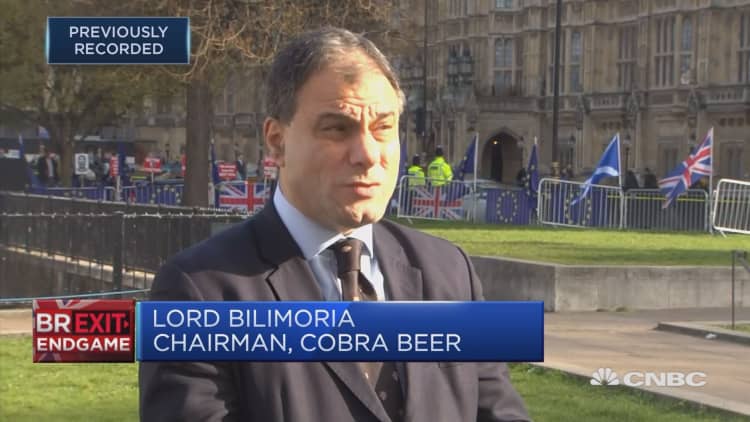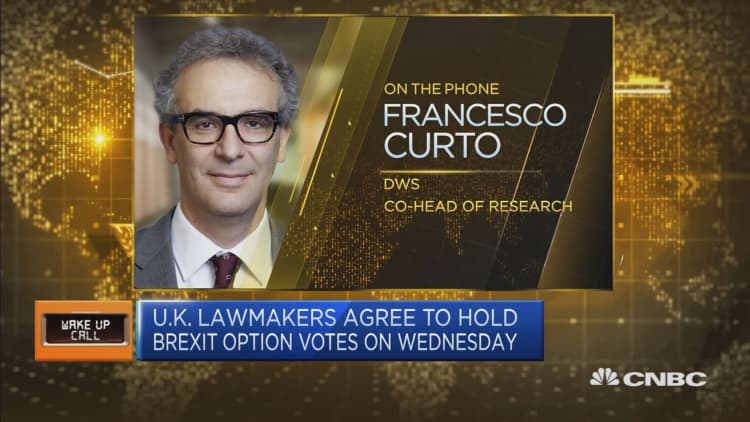Lawmakers in the U.K. have voted to effectively rip control of the Brexit process away from Theresa May's ailing government.
Working late into Monday night, MPs (Members of Parliament) voted to pass an amendment proposed by a cross-party group of lawmakers in the hope of finding a Brexit solution. The measure passed with 329 votes in favor of the proposal and 302 voting against.
The passing of the "Letwin amendment" looks to change the rules of Parliament, allowing lawmakers to set a timetable for debate and subsequent votes on alternative outcomes for Brexit. On Wednesday this week, MPs are now expected to control business in the House of Commons in order to hold the series of votes on different Brexit outcomes. This takes the power away from the government and allows MPs to put forward business motions relating to the U.K.'s departure from the EU.
These non-binding "indicative votes" will be held in a bid to find out what EU exit deal Parliament can vote through.
Ballots could now be cast on May's deal, the U.K.'s membership of the EU's single market, a customs union, a no-deal Brexit, a Canada-style free trade agreement, a second referendum or even rescinding Brexit altogether.

Oliver Letwin, the amendment's main proponent, is a member of May's Conservative Party, underlining the current division within U.K. politics. In fact, three government ministers resigned on Monday evening as they approved the amendment and rebelled against their leadership.
As these votes would be non-binding, it's still possible that the government could ignore any results. May has also said there is no guarantee she will abide by their wish for these indicative votes.
Labour MP Hilary Benn, who co-sponsored the Letwin amendment, explained to BBC radio Tuesday how the indicative vote process could work.
Benn said MPs would invited to put forward a series of propositions and the speaker of the House (of Commons) would choose the options to be listed on a piece of paper.
He added lawmakers could then vote on as many Brexit alternatives as they might support, before the options could then be narrowed down and a similar process repeated.

Sterling provided a muted reaction to the vote on Monday night, rising only slightly against the dollar at the beginning of both Asian and European trade. Some currency analysts noted that increased talk of a general election or a change of U.K. leader had weighed on the British pound on Tuesday morning.
Earlier Monday, May had confirmed that her government would oppose Monday night's motion and could not commit to supporting any consensus that emerged from subsequent indicative votes.
"The votes could lead to an outcome that is un-negotiable with the EU," she told MPs. "No government could give a blank check to commit to an outcome without knowing what it is."
The only current deal agreed between the European Union and the U.K. government is May's "Withdrawal Agreement." This has been heavily defeated by U.K. parliamentarians twice already but on Monday, May hinted that she still hoped to bring it back for a third vote.
"I continue to believe that the right path forward is for the United Kingdom to leave the EU as soon as possible with a deal, now on May 22," she said.
Government in chaos
May's government has now witnessed 29 resignations in a little over two years. That's more than the 25 ministerial resignations than Margaret Thatcher suffered in almost 12 years and the same amount as Tony Blair's government accrued in more than a decade.
May's minority government has also been defeated 22 times on the floor of the House of Commons since the last election in 2017. By comparison, Blair's government suffered just four defeats during its 10 years in office.
Brexit Secretary Stephen Barclay had warned that losing Monday night's vote would likely result in a third U.K. general election in just four years.


